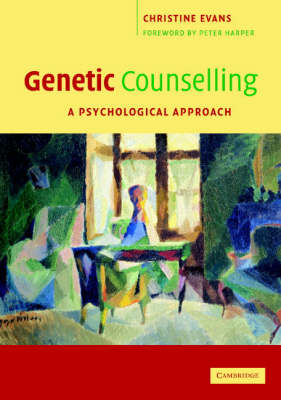
Genetic Counselling
A Psychological Approach
Seiten
2006
Cambridge University Press (Verlag)
978-0-521-67230-6 (ISBN)
Cambridge University Press (Verlag)
978-0-521-67230-6 (ISBN)
In order to inform an individual's ability to understand and manage the risks of their genetic inheritance, genetic counsellors need to be fully aware of the psychological impact of their communications. Written by a psychiatrist who later became a psychotherapist, this manual is essential reading for counsellors of all disciplines.
The role of a genetic counsellor is to mediate between the rapid advances in molecular medicine and an individual's ability to understand and manage the risks of their inheritance. Counsellors therefore need to be fully in command of the psychological impact of their communications. Written by a psychiatrist who later became a psychotherapist, this manual is essential reading for counsellors of all disciplines. It examines the psychological processes and explains why people approach and respond differently. Effective genetic counselling requires a knowledge of attachment behaviour and non-directiveness, and an in-depth understanding of empathy in order to help individuals contain anxiety and process grief and so facilitate their decision-making or help with the effects of reviewing a test result. Along with an up-to-date discussion of similar approaches in family therapy and psychoanalysis, the effect of counselling on the counsellor is also examined creatively in order to enrich the interview with clients.
The role of a genetic counsellor is to mediate between the rapid advances in molecular medicine and an individual's ability to understand and manage the risks of their inheritance. Counsellors therefore need to be fully in command of the psychological impact of their communications. Written by a psychiatrist who later became a psychotherapist, this manual is essential reading for counsellors of all disciplines. It examines the psychological processes and explains why people approach and respond differently. Effective genetic counselling requires a knowledge of attachment behaviour and non-directiveness, and an in-depth understanding of empathy in order to help individuals contain anxiety and process grief and so facilitate their decision-making or help with the effects of reviewing a test result. Along with an up-to-date discussion of similar approaches in family therapy and psychoanalysis, the effect of counselling on the counsellor is also examined creatively in order to enrich the interview with clients.
Foreword Peter Harper; Preface; 1. An overview of genetic counselling; 2. The psychological processes underlying genetic counselling; 3. Understanding individual differences in genetic counselling using Attachment Theory; 4. The role and skills of the counsellor and ideas from psychotherapy; 5. Examples of the roles and skills of the counsellor; 6. The gene and the Family System; 7. Working with parents and children; 8. The influence of the nature of the disorder on the consultation; 9. The effect on the counsellor; 10. The interview and non-directiveness; Index.
| Erscheint lt. Verlag | 9.3.2006 |
|---|---|
| Vorwort | Peter Harper |
| Zusatzinfo | 2 Line drawings, unspecified |
| Verlagsort | Cambridge |
| Sprache | englisch |
| Maße | 173 x 246 mm |
| Gewicht | 451 g |
| Themenwelt | Geisteswissenschaften ► Psychologie ► Klinische Psychologie |
| Medizin / Pharmazie ► Medizinische Fachgebiete ► Psychiatrie / Psychotherapie | |
| Studium ► 2. Studienabschnitt (Klinik) ► Humangenetik | |
| ISBN-10 | 0-521-67230-9 / 0521672309 |
| ISBN-13 | 978-0-521-67230-6 / 9780521672306 |
| Zustand | Neuware |
| Haben Sie eine Frage zum Produkt? |
Mehr entdecken
aus dem Bereich
aus dem Bereich
Eine sehr persönliche Geschichte | Der New York Times-Bestseller
Buch | Softcover (2023)
Ullstein Taschenbuch Verlag
21,99 €
Die revolutionäre Medizin von morgen (Lifespan)
Buch | Softcover (2020)
DuMont Buchverlag
16,00 €


